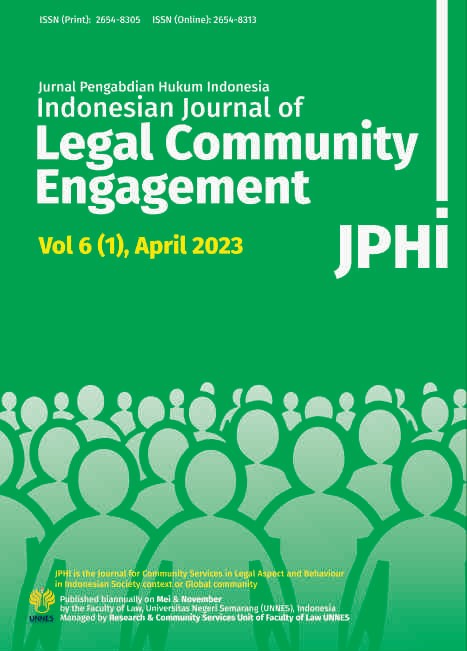Public Services Versus Covid-19: Participation of Villagers in Public Service based on E-Government in Pandemic Pelayanan Publik Versus Covid-19: Partisipasi Masyarakat Desa dalam Pelayanan Publik Berbasis E-Government di Masa Pandemi
Main Article Content
Abstract
This article aims to show how to improve public services' capability and accessibility through e-government for villagers to reduce the rate of spread and infection of Covid-19 and as community participation in alternative ways of getting public services, Electronic Government (e-Gov) or digital government exists. Electronic government (e-Gov) itself provides information and public services, business affairs, services related to governance, et cetera by using information technology tools. However, the obstacles in this e-government-based public service are in applying the information system and the knowledge and access to information on this e-government-based public service. The digital divide is found in rural communities, often uninformed and reluctant to experience new technologies. Therefore, a community service program is needed, namely Improving Community Capability and Accessibility in Utilizing E-Government Public Services for villagers in the Middle of the COVID-19 Pandemic Outbreak in Semarang Regency.
Article Details

This work is licensed under a Creative Commons Attribution-NonCommercial 4.0 International License.
All works published in the Jurnal Pengabdian Hukum Indonesian (Indonesian Journal of Legal Community Engagement) are licensed & copyrighted under a Creative Commons Attribution-NonCommercial 4.0 International License. Under this license, the authors published in the Jurnal Pengabdian Hukum Indonesian (Indonesian Journal of Legal Community Engagement) retain the copyright. All other authors using the content of the Jurnal Pengabdian Hukum Indonesian (Indonesian Journal of Legal Community Engagement)are required to cite author(s) and publisher in their work.
References
Bimasakti, Firman, et al. “Tata Kelola Pemerintahan Berbasis Electronic Government Di Kabupaten Semarang (Studi Kasus Dinas Kependudukan Dan Pencatatan Sipil Kabupaten Semarang).” Jurnal Ilmu Pemerintahan Undip 6, No. 3 (2017): 61-70. https://ejournal3.undip.ac.id/index.php/jpgs/article/view/16577
Davison, Robert M., Christian Wagner, and Louis CK Ma. “From government to e‐government: a transition model.” Information Technology & People 18, No. 3 (2005): 280-299. https://doi.org/10.1108/09593840510615888
Gronlund, Ake. Electronic Government: Design, Application and Management (London: IdeaPublishing, 2004).
Gugus Tugas Perecepatan Penangan Covid-19, retrieved from https://www.covid19.go.id/2020/04/03/infografis-covid-19-3-april-2020/
Hamdani, Fathul, and Ana Fauzia. “The Authority of the Village Government in the Management of Village Funds During the Covid-19 Pandemic”. Indonesian Journal of Advocacy and Legal Services 4, No. 1 (2022): 195-222. https://doi.org/10.15294/ijals.v4i1.53646.
Irawan, Bambang. “Studi Analisis Konsep E-Government: Sebuah Paradigma Baru dalam Pelayanan Publik”, Jurnal Paradigma 2, No. 1 (2013): 174-201. http://dx.doi.org/10.30872/jp.v2i1.351
Kurnia, Titon Slamet, Umbu Rauta, and Arie Siswanto. “E-Government dalam Penyelenggaraan Pemerintahan Daerah di Indonesia.” Masalah-Masalah Hukum 46, No. 2 (2017): 170-181. https://doi.org/10.14710/mmh.46.2.2017.170-181
Lauranti, Maria, et al. Open Government: Mengkaji Penggunaan e-government Pemerintah Daerah di Indonesia. (Jakarta: Perkumpulan PRAKARSA, 2017).
Martitah, Martitah, Saru Arifin, Slamet Sumarto, and Widiyanto Widiyanto. “Confronting E-Government Adoption in Indonesian Local Government”. Journal of Indonesian Legal Studies 6, No. 2 (2021): 279-306. https://doi.org/10.15294/jils.v6i2.47795.
Nasution, Dito Aditia Darma, et al. “Identifikasi Strategi Keberhasilan Layanan E-Government di Kota Medan.” Paedagoria: Jurnal Kajian, Penelitian dan Pengembangan Kependidikan 11, No. 2 (2020): 106-112. https://doi.org/10.31764/paedagoria.v11i2.2408
Nazir, Moh. Metode Penelitian. (Bogor: Ghalia Indonesia, 2009).
Nurdin, Andi Heny Mulawati. “Menuju Pemerintahan Terbuka (Open Government) Melalui Penerapan e Government.” Jurnal MP (Manajemen Pemerintahan) 5, No. 1 (2018): 1-17. https://ejournal.ipdn.ac.id/JMP/article/view/443
Pramusinto, Agus and M. Syahbudin Latief. "Dinamika Good Governance di Tingkat Desa." JIANA (Jurnal Ilmu Administrasi Negara) 11, No. 1 (2011): 1-13. http://dx.doi.org/10.46730/jiana.v11i01.588
Provinsi Jawa Tengah, https://corona.jatengprov.go.id/data accessed at 4 August 2020
Putri, Nadila Olivia Intan, and Hardi Warsono. "Manajemen Electronic Government di Kabupaten Semarang." Journal of Public Policy and Management Review 7, No. 2 (2018): 373-385. https://doi.org/10.14710/jppmr.v7i2.20105
Sari, Kusuma Dewi Arum, and Wahyu Agus Winarno. “Implementasi E-Government System dalam Upaya Peningkatan Clean and Good Governance di Indonesia.” Jurnal Ekonomi Akuntansi dan Manajemen 11, No. 1 (2012): 1-19. https://jurnal.unej.ac.id/index.php/JEAM/article/view/1192
Sosiawan, Edwi Arief. “Tantangan dan Hambatan dalam implementasi E-Government di Indonesia.” Seminar Nasional Informatika (SEMNASIF) 1, No. 5 (2015): 99-108.
Syaepudin, Bahrul and Adie Dwiyanto Nurlukman, “Kualitas Pelayanan Publik Melalui E-Government dengan Aplikasi Tangerang Gemilang”, Jurnal Penelitan dan Pengembangan Komunikasi dan Informatika: Jurnal Pekommas 7, No. 1 (2022): 53-62.
Triayuni, Bertania Rizqi. “Implementation of Law Number 14 of 2008 Concerning Public Information Disclosure in Realizing Good Governance”. Indonesian State Law Review (ISLRev) 1, No. 1 (2018): 53-67. https://doi.org/10.15294/islrev.v1i1.26939.
Widjajanto, Budi, Yuliman Purwanto, and Nova Rijati. “Analisis Layanan Informasi Publik Pada Website Pemerintah Provinsi Jawa Tengah.” SEMNASTEKNOMEDIA ONLINE 3, No. 1 (2015): 3-4.
Wirijadinata, Jat Jat. “Standar Pelayanan Publik Dalam Merealisasikan Akuntabilitas Kinerja Pemerintah.” Jurnal Wacana Kinerja: Kajian Praktis-Akademis Kinerja dan Administrasi Pelayanan Publik 10, No. 4 (2020): 59-70. http://dx.doi.org/10.31845/jwk.v10i4.391
Yunita, Novi Prisma, and Rudi Dwi Aprianto, “Kondisi Terkini Perkembangan Pelaksanaan E-Government di Indonesia: Analisis Website”. Seminar Nasional Teknologi Informasi dan Komunikasi 2018 (SENTIKA 2018) 23-24 March (2018): 329-336.
